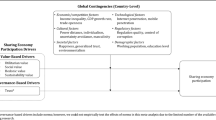Abstract
The global corporate scandals such as Enron, Worldcom and Global Crossing have raised fundamental issues of business ethics as well as economic, social and anthropological questions concerning the nature of business competition and global capitalism. The purpose of this conceptual paper is to introduce the concept of “welfare exchange” to the existing notions of economic, social and anthropological notions of business and exchange in markets and society in the 21st century. Global competition and business success in the 21st century continue to raise the nature of economic value and the interaction among diverse actors in international markets, institutions and society. We believe that the nature of such exchange between consumers and organizations, which can also be termed social marketing, need to increasingly take into account a welfare and ethical component. In this paper, we introduce our concept of welfare exchange to emphasize the importance of such welfare and ethical issues in the global business environment of the 21st century.
Similar content being viewed by others
References
Abrahamson E. (1996) Management Fashion. Academy of Management Review 21:254–285
Aharony J., Swary I. (1996) Additional Evidence on Information-based Contagion Effects of Bank Failure. Journal of Banking & Finance 20:57–69
Andreasen A. (2002) Marketing Social Marketing in the Social Change Marketplace. Journal of Public Policy & Marketing 21:3–13
Aoki M. (2001) Toward a Comparative Institutional Analysis. MIT Press, Cambridge.
Auger P., Burke P., Devinney T., Louviere J. (2003) What Will Consumers Pay for Social Product Features? Journal of Business Ethics 42:281–304
Banerjee A. V. (1992) A Simple Model of Herd Behavior. Quarterly Journal of Economics 107:797–817
Banks M., Lovatt A., O’Connor J., Raffo C. (2000) Risk and Trust in the Cultural Industries. Geoforum 31:453–464
Barney J. B., Hansen M. H. (1994) Trustworthiness as a Source of Competitive Advantage. Strategic Management Journal 15:175–190
Barzel Y. (1982) Measurement Cost and the Organization of the Markets. Journal of Law and Economics 25:27–48
Bazerman M. H. (2001) Consumer Research for Consumers. Journal of Consumer Research 27:499–504
Bernardi R. (2006) Associations Between Hofstedes’ Cultural Constructs and Social Desirability Response Bias. Journal of Business Ethics 65:43–53
Bernstein P. L. (1996) Against the Gods – the Remarkable Story of Risk. John Wiley & Sons, London.
Biggart N., Delbridge R. (2005) Systems of Exchange. Academy of Management Review 30:127–152
Bourdieu P. (1984) Distinction: A Social Critique of the Judgement of Taste. Harvard University Press, Cambridge, MA
Brenkert G. (2002) Ethical Challenges of Social Marketing. Journal of Public Policy & Marketing 21:14–25
Broniarczyk S., Alba J. (1994) The Importance of Brand in Brand Extension. Journal of Marketing Research 31:214–228
Choi C. J., Millar C. (2005) Knowledge Entanglements. Palgrave Macmillan, London
Darby M., Karni E. (1973) Free Competition and the Optimal Amount of Fraud. Journal of Law and Economics 16:67–88
Donaldson T. (2003) Editor’s Comments: Taking Ethics Seriously – a Mission Now More Possible. Academy of Management Review 28:363–366
Felcher M. (2001) It’s No Accident: How Corporations Sell Dangerous Baby Products. Common Courage Press, Monroe, ME.
Fombrun C. (2000) Corporate Reputation. Harvard Business School Press, Boston.
Giddens A. (1990) The Consequences of Modernity. Polity Press, Cambridge
Grewal R., Dharwadkar R. (2002) The Role of the Institutional Environment in Marketing Channels. Journal of Marketing 66:82–97
Jeffries F., Reed R. (2000) Trust and Adaptation in Relational Contracting. Academy of Management Review 25:873–882
Kim J. B., Choi C. J. (2003) Reputation and Product Tampering in Service Industries. Service Industries Journal 23:3–11
Kline W. (2006) Business Ethics from the Internal Point of View. Journal of Business Ethics 64:57–67
Konrad A., Steurer R., Langer M., Martinuzzi A. (2006) Empirical Findings on Business–Society Relations in Europe. Journal of Business Ethics 63:57–67
Kostova T., Zaheer S. (1999) Organizational Legitimacy Under Conditions of Complexity: the Case of the Multinational Enterprise. Academy of Management Review 24:64–81
Machina M. J. (1987) Choice Under Uncertainty: Problems Solved and Unsolved. Journal of Economic Perspectives 1:121–154
Mauss, M.: 1955, The Gift, reprinted (Routledge, London)
Millar C. J. M., Choi C. J. (2003) Advertising and Knowledge Intermediaries: Managing the Ethical Challenges of Intangibles. Journal of Business Ethics 48:267–277
Mitchell M. (1989) The Impact of External Parties on Brand Name Capital. Economic Inquiry 30:601–618
Negus K. (2002) The Work of Cultural Intermediaries and the Enduring Distance Between Production and Consumption. Cultural Studies 16:501–515
Nelson P. (1970) Information and Consumer Behavior. Journal of Political Economy 70:311–329
North D. (1990) Institutions, Institutional Change and Economic Performance. Cambridge University Press, Cambridge
Picou A., Rubach M. (2006) Does Good Governance Matter to Institutional Investors? Evidence from the Enactment of Corporate Governance Guidelines. Journal of Business Ethics 65:55–67
Reynolds C., Schultz F., Hekman D. (2006) Stakeholder Theory and Managerial Decision-making. Journal of Business Ethics 64:285–301
Schmalensee R. (1982) Product Differentiation Advantages of Pioneering Brands. American Economic Review 72:349–365
Schelling T. C. (1978) Micromotives and Macrobehavior. Yale University Press, New Haven.
Schwarzkopf D. (2006) Stakeholder Perspectives and Business Risk Perception. Journal of Business Ethics 64:327–342
Williamson O. E. (1985) The Economic Institutions of Capitalism. Free Press, New York.
Author information
Authors and Affiliations
Corresponding author
Rights and permissions
About this article
Cite this article
Choi, C.J., Eldomiaty, T.I. & Kim, S.W. Consumer Trust, Social Marketing and Ethics of Welfare Exchange. J Bus Ethics 74, 17–23 (2007). https://doi.org/10.1007/s10551-006-9128-z
Received:
Accepted:
Published:
Issue Date:
DOI: https://doi.org/10.1007/s10551-006-9128-z




